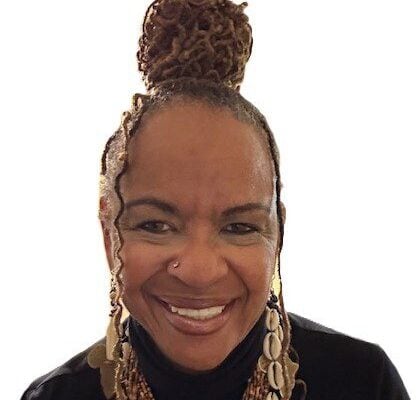Remembering
This month, on Oct. 14, 2025, George Floyd would have turned 52 years old. Floyd’s murder was so significant and disturbing that two years ago, in 2023, on what would have been his 50th birthday, President Biden issued a statement that reads in part: “Today, we join his family to honor his life and legacy. And we remember the tragedy and injustice of his death that sparked one of the largest civil rights movements in our nation’s history and inspired the world. George Floyd’s murder exposed for many what Black and Brown communities have long known and experienced — that our nation has never fully lived up to its highest ideal of fair and impartial justice for all under the law.”
It’s been reported that Floyd’s murder sparked “the largest racial justice protests in the United States since the Civil Rights Movement”. In fact, the impact of his murder was visible around the world as people gathered in anger and frustration towards an unjust system that continues to seemingly condone the murder of unarmed Black men.
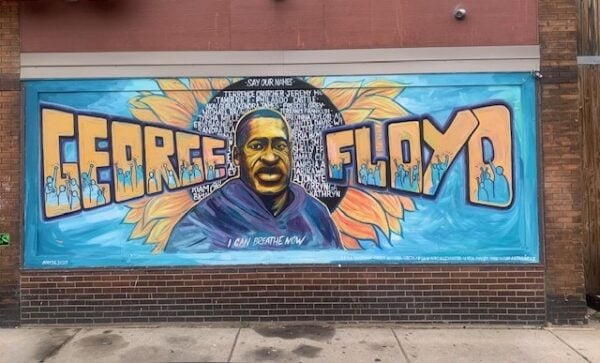
In Germany, an English soccer player wore a shirt underneath his jersey that said, “Justice for George Floyd.” In New Zealand, protestors of multiple ethnic backgrounds joined together, “creating a movement for racial progress unlike anything the country had seen for years,” CBS News reported in 2021. In France, protestors demanded acts of justice, not just conversations. One protestor stated, “We’ll protest in the street every week if necessary.” In Columbia, Floyd’s death fueled their #BlackLivesMatter protests and inspired citizens to begin filming confrontations with police, per a 2021 CBS Twitter post.
The largest protests outside of the U.S. took place in the United Kingdom. Multiple crowds of hundreds gathered outside the U.S. Embassies in London and Berlin, protesting the death of George Floyd and joining in solidarity with protestors in the U.S. In London, specifically, protestors took a knee for nine minutes in Trafalgar Square before marching on to the U.S. Embassy.
Clearly George Floyd’s death galvanized people around the world for a common cause and sparked a global reckoning with racism.
One organization in Britain decided to move beyond rhetoric. Board members of this organization were inspired to dig deep, explore the core reason for the anger and frustration of Black people, and do something about it.
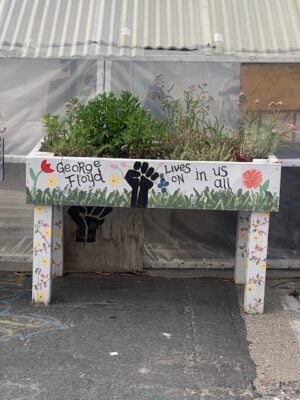
The Black Lives Matter protests resulting from the murder of George Floyd motivated them to take a deep dive into the impact of slavery from the rather unique perspective of the enslaver and those who benefited from the slave trade. That organization is Scott Trust Limited, which owns the Manchester Guardian newspaper.
During the early 1800s, many British business entities invested heavily in the slave trade within the colonies. Their financing of the trade ensured cheap labor to fuel the economy of the colonies and thus their own financial well-being. The Manchester Guardian newspaper is one such entity. This newspaper was founded by John Edward Taylor with financial backing from 11 other men. In 2020, the Scott Trust Limited commissioned academic researchers to determine if the original backers had ties to the transatlantic slave trade. What they found astonished and embarrassed them.
Reckoning
The Manchester Guardian has a reputation of being a liberal paper founded by reformists in the aftermath of the 1819 Peterloo massacre in England where 60,000 people gathered demanding the right to vote, freedom from oppression, and justice.
However, this liberal newspaper with noble beginnings had a dark secret. The Guardian flourished as a newspaper because the capital that funded it was derived from the proceeds of slave labor, specifically cotton slave labor.
Reparations
The Scott Trust Limited did something many Black Americans have wanted this country to do. In March, 2023, they issued an apology for the founders’ connection to the Transatlantic Slave Trade.
Next, they “put their money where their mouth is”. The Scott Trust Limited committed $10 million to a restorative justice program they named the Legacies of Enslavement Project. The project will extend over a period of 10 years and is designed for the region of the country most impacted by the slave trade connected to the Guardian (the Lowcountry southern region).
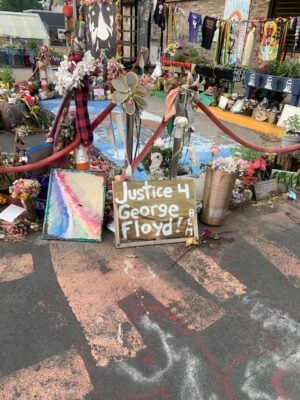
Why the Lowcountry? Their academic research revealed that the enslaved Blacks who provided the free labor that fueled the prosperity enjoyed by the founders of the Manchester Guardian were the ancestors of the Gullah Geechee people located along the east coast Lowcountry (North and South Carolina, Georgia, and the northern tip of Florida). It was these Gullah Geechee ancestors who had been left out of the history of the Manchester Guardian.
A bit of history that may not be known by many is that General Sherman presented Savannah as a Christmas gift to Lincoln as the Civil War came to an end with the capture of the city. The “gifting” of Savannah marked the conclusion of the war’s ending and was accompanied with “about 25,000 bales of cotton.” That cotton had direct linkage to the Manchester Guardian. So much so that the Guardian has named a special issue that tells this story, “The Cotton Capital: How Slavery Shaped the Guardian, Britain and the World.” Scott Trust has initiated steps to address the harm done to Black people that began with slavery.
After the research was done and the report written, the Scott Trust Board asked this question: “If we can inherit wealth and benefit over centuries from compound interest, do we not also equally inherit responsibility? They rightfully noted that ugly parts of history do not stay neatly in the past. They also noted that chattel slavery left two fundamental legacies:
1) inequality between the people who benefited from the wealth generated from slavery and the communities who have suffered and “continue to suffer because of the crimes against their ancestors and the economic system built on the back of their enslavement,” and
2) the existence of a racial hierarchy that has lasted for centuries.
These two fundamental legacies are the backdrop for the Scott Trust Legacies of Enslavement Project which has already gotten underway.

Restoration
This project is not about do-gooders in Britain who want to do something for the Gullah Geechee communities. Rather, it is about developing a relationship with the descendants of enslaved Africans — listening to them and together deciding what atonement looks like.
I spoke with leaders of the project and was told that an ideal result for them is that the Gullah Geechee community will see the Manchester Guardian as a very strong partner in their restoration and that they feel empowered. The Manchester Guardian wants to be a model of what reparations can look like to descendants of enslaved communities. Additionally, they want to encourage other institutions to go on this journey – as painful and as uncomfortable as it may be. The end result is a win-win for all.
The weight of the knee felt around the world
In 2023 I traveled to Minneapolis with my sisters and saw firsthand the sacred memorial that marks the very ground where George Floyd died. I marveled at the efforts to make something beautiful out of that ugly moment with the breathtaking paintings and murals on surrounding buildings. With emboldened hesitancy, I walked onto the George Floyd Square past the entry sign which read, “You are now entering the free state of George Floyd.” With tears in my eyes, I read the words on a sign penned by Miss Mari, “For every Black man and woman who called out to their mothers because Heaven was approaching faster than the paramedics. I now see the privilege – not in my circumstances, but in the breath I still breathe – because the driver’s license I carry reads more like an obituary when found in the hands of the police.”
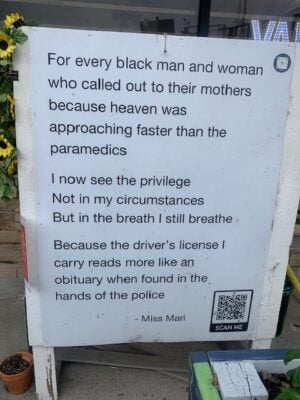
I wept and knelt at the “Say Their Names” Memorial Cemetery that memorializes Black lives lost to police brutality. The cemetery has over 100 headstones made of cardboard, plastic and paper and is one block from where George Floyd took his last breath. Each headstone has the name of a Black person killed by police.
The weight of the knee that killed George Floyd was felt by millions of people around the world. Many protested. Many rioted. Many got angry. Many cried. The Manchester Guardian got busy with the work of trying to right the wrong that is the fundamental source of the anger, frustration, and tears – the enslavement of millions of Blacks that fueled the economy in both the US and Britain.
The U.S. can learn from Britain. Companies across the U.S can learn from the Manchester Guardian. Together, the oppressed and the oppressor can work to make amends and create a different reality for generations to come. But will we? What the Manchester Guardian is doing is courageous. To date it doesn’t appear that the U.S. has that same type of courage.
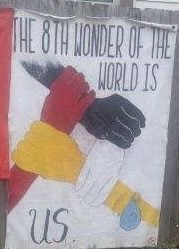
Currently, I play the role of the judge in the off-Broadway touring production, “Justice on Trial Reloaded,” written and directed by Chad Lawson Cooper, Jr. The play focuses on reparations for Black Americans from the U.S. Justice Department. In the play, the plaintiffs (Black Americans) win a substantial amount of dollars in reparations from the government. While it is a fictional script, the reality is that reparations to descendants of enslaved Blacks is long overdue. It doesn’t have to be cash dollars – but rather, free education, housing, and substantial opportunities to earn living wages in par with the ever-increasing cost of living.
I end this column with words from a painting on the fence next to the “Say Their Names” Memorial Cemetery: “The 8th Wonder of the World is US”. The wonders of the world represent the world’s most spectacular natural features and human-built structures.
This sign reminds us, as humans, that we too are world wonders – we are spectacular, phenomenal, and powerful. That means we have the capacity to change the world we live in. With regards to race relations in the U.S., the question remains: “Will we?”
To learn more about the Manchester Guardian’s research, visit here.
MAXINE BRYANT
Maxine Bryant, Ph.D. is the founder of GriotSpeaks, author and African-American culture keeper. Dr. Bryant replaces mythology with truth about Africa and the African Diaspora experience. Learn more about her at www.drmaxinebryant.com and email her at mlb@drmaxinebryant.com.

